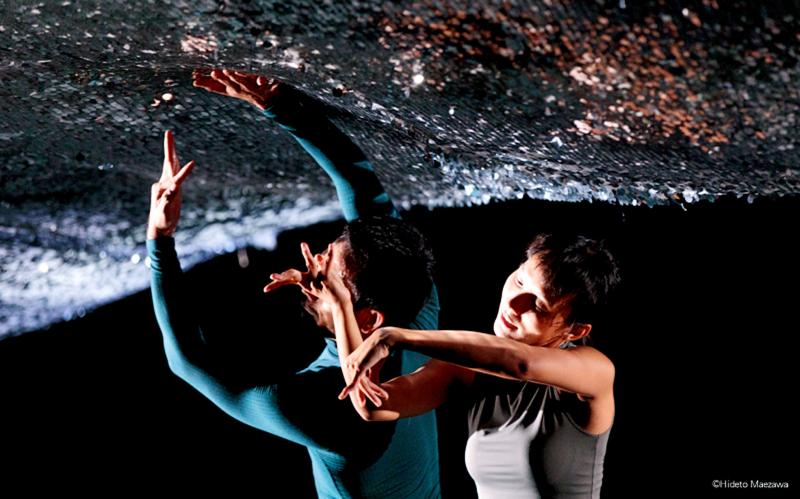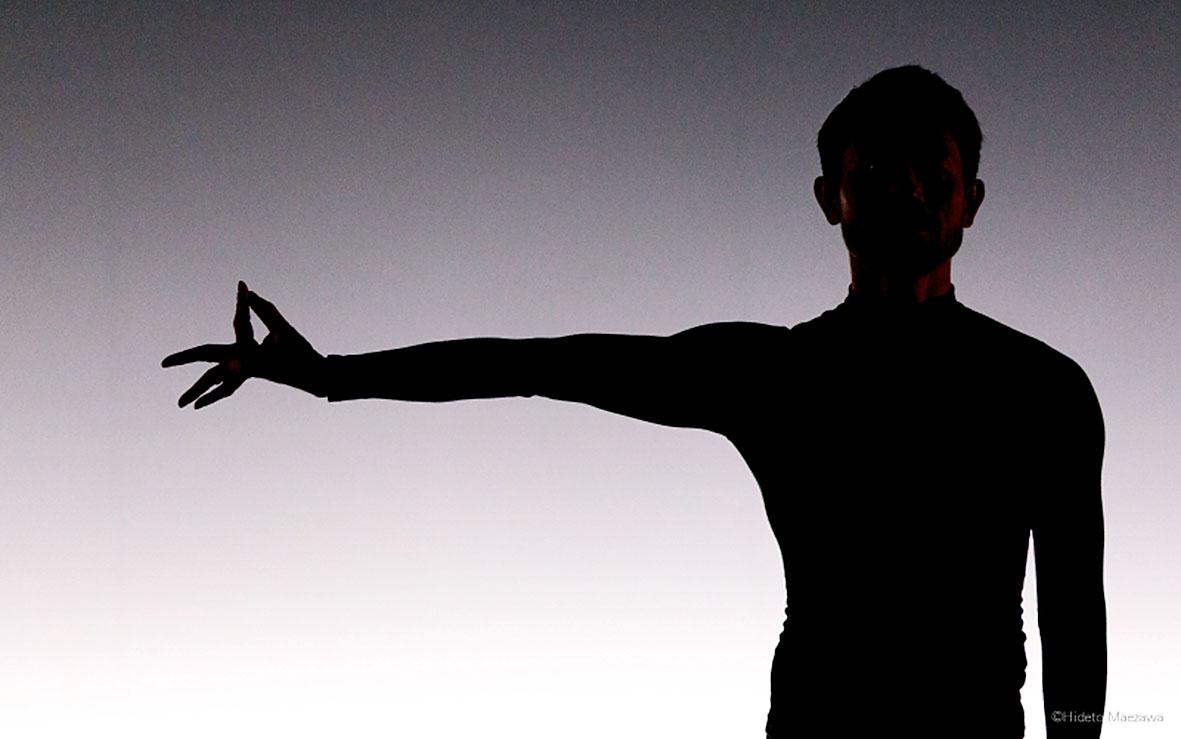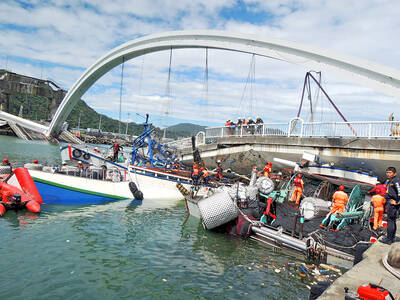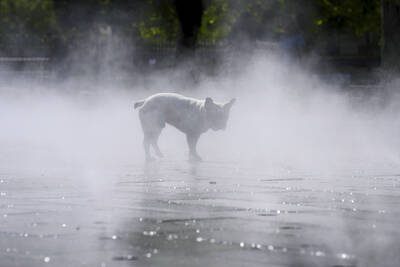It is not often to hear someone talk about how much they enjoyed their time in quarantine — but Pichet Klunchun, a Thai dancer/choreographer/artist, has built his career by going against convention and conventional thinking.
I caught up with Pichet — who is back in town to perform his latest work, No. 60, this weekend as part of the Taipei Arts Festival — by telephone on Saturday last week, just after he had moved out of his quarantine hotel.
Spending 14 days in isolation — even from the other dancer who will be performing with him — was a chance for some quiet reflection, Pichet said.

Photo courtesy of Hideto Maezawa
“I really enjoyed it, because in my life I am always in the studio, always practicing,” he said before adding one very large caveat: “But if this was before 2020, I think I would have died — no Internet, no Messenger, nothing.”
And this from a man who when he is not choreographing, performing, teaching or running his own theater in Bangkok, has also become a well-known painter.
It is a good thing he came through quarantine with a positive outlook, because he and his team face another round of 14 days in quarantine when they return to Bangkok.

Photo courtesy of Hideto Maezawa
But first, there are two shows to do for the festival, only the second time — technically — that his company has presented No. 60, which had its world premiere in Japan at TPAM (Performing Arts Meeting in Yokohama) on Feb. 15.
It was presented in October last year as a “work-in-progress” at the Esplanade — Theatres on the Bay in Singapore as part of the da:ns festival.
While the show is very new, the ideas behind it date back to 2001.
“The concept of No. 60 was trying to find a way to understand my dance technique, from the traditional movements. I am looking back into my work: I am a demon, Black & White, Chui Chai,” he said.
Pichet began training in Thailand’s classical Khon mask dance when he was 16 and earned a bachelor’s degree in traditional Thai dance, spending years learning the Theppanom canon of basic poses and movements.
However, by the time he won an Asian Cultural Council fellowship for stays in New York City and at UCLA, he was looking for ways to deconstruct Khon and introduce contemporary movements to it — and his exposure to the Western modern dance world in the Big Apple galvanized him.
He has said before that he found freedom in deconstruction.
For example, in 2006’s I am a demon, he explored different facets of the Khon characters and using various scientific ideas to demonstrate the vitality of each character. In 2011’s Black & White, he used battle scenes familiar to generations of Thais from temple murals of the Ramayana to explore the equilibrium of opposing forces.
More than a decade ago, he also started drawing, making diagrams as a way of figuring out the ways dancers shape and form their bodies in Thai classical dance, a practice that has become a crucial component of his research and explorations.
His notebooks of the drawings and diagrams have been published in book form and displayed in exhibitions about his work.
“In 2016, I wrote all the diagrams [for No. 60], and started production in 2019 to create the show,” Pichet said.
He explored six concepts that are central to his life as a dancer, to all dancers, he said.
The first is freedom — “freedom of mind, body, movement;” second is understanding the body as a dancer; third is beauty; fourth is independent solos, improvisation; fifth is thinking of something new and sixth is acceptance of yourself, of other people, “allowing each other to be part of the creation, of the world,” he said.
So how did you get from six to the 60 in the title, I asked.
In the traditional Khon vocabulary there are 59 poses that every dancer must memorize, he said.
It is their toolbox, so to speak.
By rethinking and reimagining the basics, Pichet said he hoped he might come up with a new set of principles, a new philosophy for young Thai classical dancers.
“I was looking for No. 60 — the concept of knowledge, of a way to take you back into the movement,” he said. “Unfortunately, I could not find it.”
So the search for No. 60 could perhaps be a metaphor for life?
“Your No. 60 and my No. 60 are different,” he said with a laugh.
While Pichet uses Kornkarn Rungsawang from his Pichet Klunchun Dance Company in the piece, he turned to London-born, Singapore-based freelance sound artist Zai Tang for the soundscape and young Taiwanese lighting designer Ray Tseng (曾睿琁) for the set design and lighting — a reflection of his long-time interest in intercultural exchange.
His willingness to push boundaries, explore different media and cultures has been what has brought him so often to Taiwan over the years, from his first appearance with the Novel Hall Dance Series with French choreographer Jerome Bel in Pichet Klunchun and Myself, to his company’s terrific Dancing With Death at the Cloud Gate Theater in August 2017, to his various collaborations with Taiwanese dancer/choreographer Chen Wu-kang (陳武康) in the past few years.
Pichet said that he and Zai worked together in Bangkok as No. 60 took shape, discussing what Khon music is and how it relates to the traditional movements and how to use each element.
However, that does not mean that audiences will be hearing a lot of “traditional” music from Zai, who shares the stage with Pichet and Kornkarn.
“I love the music, he worked very hard on it,” Pichet said.
No. 60 runs 60 minutes, without intermission, and comes with the warning that latecomers will not be admitted.
This story has been updated since it was first published.

Before the recall election drowned out other news, CNN last month became the latest in a long line of media organs to report on abuses of migrant workers in Taiwan’s fishing fleet. After a brief flare of interest, the news media moved on. The migrant worker issues, however, did not. CNN’s stinging title, “Taiwan is held up as a bastion of liberal values. But migrant workers report abuse, injury and death in its fishing industry,” was widely quoted, including by the Fisheries Agency in its response. It obviously hurt. The Fisheries Agency was not slow to convey a classic government

Not long into Mistress Dispeller, a quietly jaw-dropping new documentary from director Elizabeth Lo, the film’s eponymous character lays out her thesis for ridding marriages of troublesome extra lovers. “When someone becomes a mistress,” she says, “it’s because they feel they don’t deserve complete love. She’s the one who needs our help the most.” Wang Zhenxi, a mistress dispeller based in north-central China’s Henan province, is one of a growing number of self-styled professionals who earn a living by intervening in people’s marriages — to “dispel” them of intruders. “I was looking for a love story set in China,” says Lo,

It was on his honeymoon in Kuala Lumpur, looking out of his hotel window at the silvery points of the world’s tallest twin skyscrapers, that Frank decided it was time to become taller. He had recently confessed to his new wife how much his height had bothered him since he was a teenager. As a man dedicated to self-improvement, Frank wanted to take action. He picked up the phone, called a clinic in Turkey that specializes in leg lengthening surgery — and made a booking. “I had a lot of second thoughts — at the end of the day, someone’s going

It turns out many Americans aren’t great at identifying which personal decisions contribute most to climate change. A study recently published by the National Academy of Sciences found that when asked to rank actions, such as swapping a car that uses gasoline for an electric one, carpooling or reducing food waste, participants weren’t very accurate when assessing how much those actions contributed to climate change, which is caused mostly by the release of greenhouse gases that happen when fuels like gasoline, oil and coal are burned. “People over-assign impact to actually pretty low-impact actions such as recycling, and underestimate the actual carbon